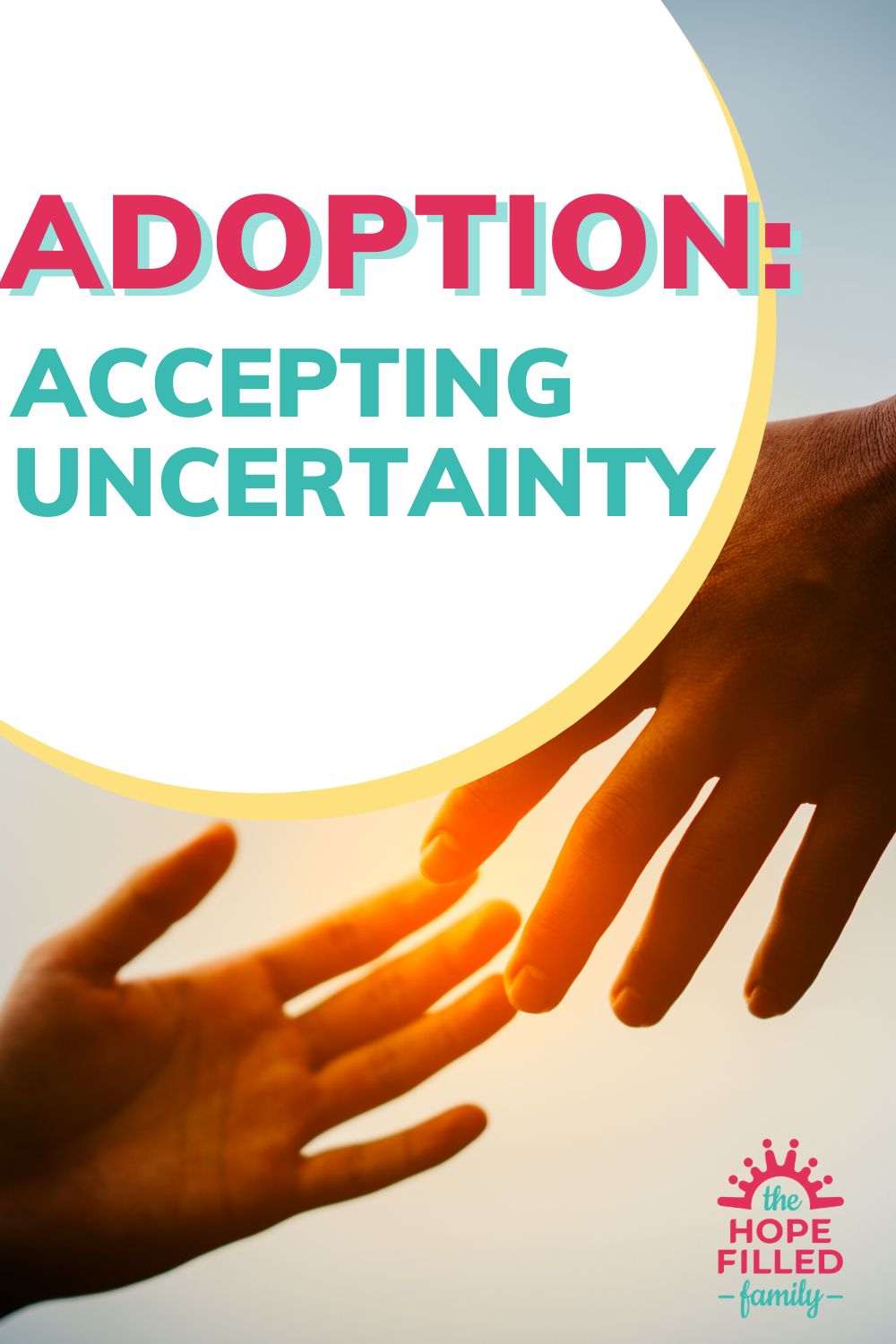I use affiliate links in some blog posts. If you click through and make a purchase, I earn a small commission at no extra cost to yourself. Thank you for your support.
It is a phrase that my husband and I are becoming all too familiar with.
“This child requires a family who can accept the uncertainties surrounding his future.” Any child who has been placed for adoption has an uncertain future – and this is truer the younger they are.
Of course, none of us know what the future brings for ourselves or our children, adopted or not. Either of my birth children could be diagnosed with a terminal illness next week, or be hit by a car, or face eating disorders or depression in their teens.
But there are also a lot of knowns.
For example, I know the paternity of my birth children – and, therefore, I know family medical history. I know that we don’t have a history of heart disease, for example. I also know the ethnicity of our children – and therefore I know roughly how they will look as they grow up – and I know that they’ve never been abused or neglected. I know that, having only ever experienced love and security, my birth children’s chances of making it to adulthood as well-adjusted, fully-functioning adults are fairly high.
These are just some of the things we may not know about a child or children who we eventually adopt.

Adoption isn’t a quick-fix
Those who hope that adoption will eradicate all the pain and hurt endured by a child prior to being placed in care are sadly mistaken. Adopted children will always bear the scars of a rough start in life, even if they were too young to remember. (See Why Adopted Children Suffer – Even if they’ve Been in Care since Birth.)
Human brains do more developing in the first year of life than in any other – in second place is the second year of life, and in third place is (you guessed it) the third year of life. So if even a month or two of the first three years of life are screwed, then you can appreciate the damage this does.
And this is without contemplating the experience in utero. Perhaps a child inhaled tobacco, or suffered the effects of alcohol or drugs that mum took in pregnancy. Perhaps they were injured because mum was being physically abused when pregnant. They would doubtless have sensed some of the stress experienced by mum and her environment too.
Even being placed in care – undoubtedly a good thing, removing a child from an environment of neglect, abuse or both – takes its toll, as children then experience loss, instability, a change in their primary care-giver, new adults to respond to, new attachments to be made, and countless other effects, all of them far too traumatic for a small child to be expected to cope with. (For more on this, check out my article on the Four Types of Attachment Styles.)
A plethora of uncertainties
An adopted child’s ‘uncertainties’, therefore, do not just pertain to health, which alone will hold many question marks (especially for a very young child about whom little can be diagnosed), but also emotions and mental stability. (See Five Ways my Toddlers are Different from Yours.)
Can you imagine approaching adolescence – a challenging time for even the most stable youngster – unsure of your own identity? Unsure of who you are, where you came from, perhaps questioning what’s wrong with you, that your birth parents couldn’t cope with raising you? Or maybe – worse – you might be only too aware of who your birth parents were – and, therefore, scared stiff of turning into your violent dad or alcoholic mum.
Adoption is not a solution to ‘fix’ a broken child. It is a lifelong commitment to lovingly parent him or her through good and bad, nurture them through the pain of the past, and face the uncertainties of the future together.
Can we accept uncertainty?
So – back to the original challenge. Can we ‘accept uncertainty’, in all the bleak ways we might define that phrase? Are we rooting for this child, not just this year but in five, ten and twenty years’ time? Can we be advocates for this child when he’s lagging behind his peers at school, when he’s undergoing a serious operation, when he’s sitting in police custody in his teens?
Once again, I find myself grateful that we don’t go through this process alone. God does not abandon us to the dark cloud of hopelessness.
Instead, he offers great hope and certainty – not in who we are, and how our lives might end up – but in who He is – the one, true, dependable, unchangeable Rock. With us through the good and the bad. Advocating for us, and our children, in every situation.
“Now faith is confidence in what we hope for and assurance about what we do not see.” (Hebrews 11:1)
“The Lord is my rock, my fortress and my deliverer; my God is my rock, in whom I take refuge, my shield and the horn of my salvation, my stronghold.” (Psalm 18:2)
“If you love me, keep my commands. And I will ask the Father, and he will give you another advocate to help you and be with you for ever – the Spirit of truth.” (John 14:15-17)
Just beautiful. (And I love how sensible you are!) No we don’t know what’s going to happen to our families in the next week/day/hour, so this is just another facet of a life that you’ve already become increasingly skilled at navigating during the past six(!) years. And he always goes before – he is incredible! X